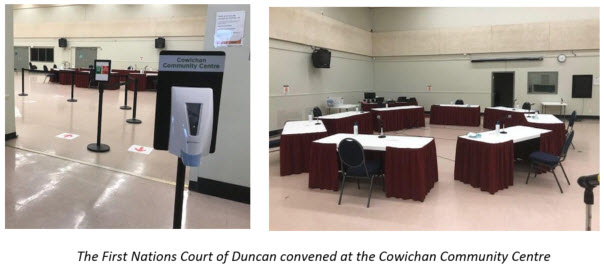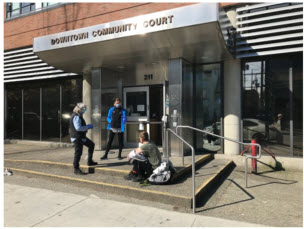When some court operations were suspended in March 2020 to reduce the spread of COVID, the BC Provincial Court’s specialized courts faced significant challenges. They had to find ways to continue the support and therapy they offer clients without endangering their health. The BC Provincial Court operates nine Indigenous and five other specialized courts. In a previous eNews we reported on how the Drug Treatment Court of Vancouver adapted during the pandemic. Today we offer an update on some of our other specialized courts.
First Nations Court of Duncan
The First Nations Court of Duncan (FNCD) incorporates restorative justice features and Indigenous practices focusing on healing and reparation. Sentencing hearings in First Nations Court often involve many participants – offenders (clients) generally sit in a circle with the judge, lawyers, Elders, and perhaps victims and support people. Because the Duncan courthouse does not have a room large enough to permit safe physical distancing, when in-person sittings were suspended in March 2020 the Court operated temporarily with participants connecting by telephone or remotely.
However, as First Nations Court focuses on healing the individual and the community through personal interaction amongst all participants, the lack of in-person contact was compromising the participants’ ability to engage with the Elders. The Provincial Court worked strenuously with government to find an alternate location where in-person hearings could be held safely during the pandemic. A team of Court and government facilities personnel worked with health consultants to find appropriate facilities - often a challenging task - and modify them with safety measures.
Locations considered and visited included local hotels, Council Chambers at Duncan City Hall, and various rooms at the Cowichan Community Centre. The Community Centre was determined to be the best fit and has proved to be a safe and comfortable setting allowing our clients to continue their healing journey during the enormous challenges posed by the pandemic.

We are very thankful for the tireless efforts of our Court Services team and all other court participants who located and organized sufficiently large space in the Community Centre for the FNCD to convene in-person appearances. The FNCD’s client numbers have remained strong throughout the pandemic, as demand for access to the court continues to increase.
Aboriginal Family Healing Court Conferences
During the COVID pandemic we have taken several steps to ensure that the Aboriginal Family Court at New Westminster could continue to safely support families. Because is not uncommon for an Aboriginal Family Healing Case Conference (the “AFHCC”) to have 20 or more participants, it quickly became obvious that we needed to explore venues others than the New Westminster courthouse for our conferences. The challenge was to find a space that could safely accommodate our numbers with physical distancing, and also meet all the usual requirements of a courtroom, including security and technological connectivity. This was done in partnership with the First Nations Court of New Westminster and was facilitated through the diligent efforts of the Court Services Branch.
Even after finding a suitable new location, convening AFHCC in person has been subject to the waves of COVID since March 2020. At various times, we felt that in-person appearances posed too much risk and we convened remotely instead. While there is no true substitute for the power of meeting face to face, a remote sitting of AFHCC has been preferable to adjourning into the unknown future, particularly since our focus is the well-being of vulnerable children and their families. The AFHCC’s partner agency, Spirit of the Children, assisted by making its COVID-modified conference room available to those participants who could not connect to AFHCC remotely from home, thus ensuring no one was excluded.
We look forward to a day when we can put COVID behind us, but for now, we continue to adapt as needed to keep our AFHCC running as smoothly as possible.
First Nations Court of New Westminster
Like its sister court the AFHCC, the First Nations Court of New Westminster (the “FNCNW”) has continued operating in-person, but virtually when necessary due to increasing COVID numbers in the Greater Vancouver area. We learned quickly that virtual appearances are not ideal for Elders, clients, their families, their support people, and our other court participants to build relationships and build the trust necessary to support our clients’ through their healing journeys. We therefore strive to include as many in-person sentencings and review hearings as possible in the FNCNW.
Sentencing hearings in the FNCNW have sometimes been delayed when spiking COVID numbers in our communities caused us to suspend in-person appearances. However, we are very pleased that demand by Crown, defence counsel, and potential candidates for access to the FNCNW’s services continues to grow. Our active client list remains high, with more than 60 clients at times. We were very thankful the Court was able to schedule additional sitting dates in November and December 2021 to address the backlog created by COVID-related adjournments.
Downtown Community Court, Vancouver
From March through May 2020, cases in the Downtown Community Court (the “DCC”) were heard in the centralized “hub court” for Vancouver. When the Community Court resumed operation in its own location in June 2020, it modified procedures to ensure physical distancing.

Its integrated case management teams were able to provide clients with support and services, either in-person or remotely, throughout 2020 and 2021. The continued on-site support of Forensic nursing staff and part-time attendance by a psychiatrist throughout the pandemic has helped to maintain some of the unique features of DCC, especially for people who can benefit from mental health supports. Other DCC services particularly needed during the pandemic related to health, housing, financial assistance, COVID information, and public safety. Demand for DCC teams’ assistance was especially high during periods when many other facilities in Vancouver’s Downtown Eastside remained closed.
Many of the DCC’s programs were suspended for periods during 2020 to avoid transmitting COVID-19, but its Street Crew and Art Therapy program were able to start up again in June 2020. And in January 2021, it added a new dental hygiene program. With help from Deputy Sheriffs to manage queues, dental hygiene students from the University of BC set up tables under tents each month on cheque-issue day, and provide information, referrals, and dental hygiene kits. Other programs restarted in 2021 but have been suspended again temporarily with the onset of the Omicron variant.
Victoria Integrated Court
As in other courts, in-person sittings of the Victoria Integrated Court (the “VIC”) were suspended in March 2020. Its clients appeared in regular criminal courts until September, initially mostly by telephone and later by videoconference if they had internet and computer access. However, the designated Integrated Court Crown and defence lawyers continued to oversee and manage the VIC files and arranged to have matters put before a judge with experi¬ence in the VIC whenever possible during this period.
Due to the importance of consistency, predictability, and in-person court appearances for the VIC’s clients, it resumed weekly sittings in September 2020. However, space permitted only one client, their lawyer, and their team representative to be in the courtroom at a time. As a result, clients could only attend in person when necessary for their type of court appearance. VIC has carried on using a hybrid model with some participants appearing in person and some by video until January 2022 when all proceedings are again being conducted remotely or adjourned due to the spread of the Omicron variant.
One positive outcome of the VIC’s use of MS Teams during the pandemic was that probation officers and bail supervisors not previously able to attend court began to attend by video from their offices to share information about the client. On the other hand, fewer ‘reviews’ or ‘progress hearings’ have been held because of the limitations on in-person court appearances.
From all the Provincial Court’s Specialized Courts
Chief Judge Melissa Gillespie says, “While the pandemic has affected the work of our specialized courts, each of them has found a way to continue to support its clients within the limits imposed by necessary health measures. Our specialized court teams remain hopeful for all their clients, victims, and their families, as well as for everyone who supports them in these important courts. As we continue to work together, we must maintain our hope for a brighter tomorrow for us all.”
See too Vancouver Drug Treatment Court – meeting COVID with creativity & flexibility eNews 31/08/2021

